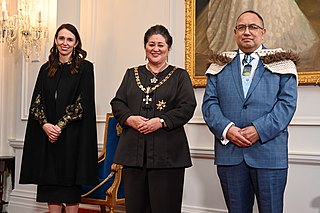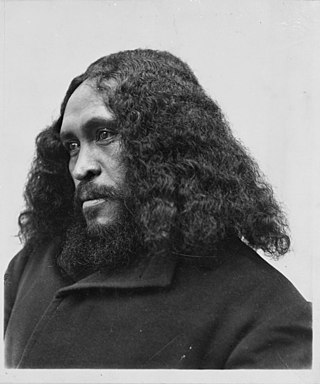
The Order of precedence in New Zealand is a guide to the relative seniority of constitutional office holders and certain others, to be followed, as appropriate at State and official functions. The previous order of precedence was revoked and Queen Elizabeth II approved the following Order of Precedence in New Zealand effective 20 September 2018:
- The Monarch of New Zealand.
- The Governor-General or, while acting in the place of the Governor-General, the officer administering the Government
- The Prime Minister
- The Speaker of the House of Representatives
- The Chief Justice
- The Dean of the Diplomatic Corps
- The Deputy Prime Minister
- Ministers of the Crown
- Former Governors-General
- Ambassadors and High Commissioners in New Zealand and Chargés d’Affaires accredited to New Zealand.
- The Leader of the Opposition in the House of Representatives
- Leaders, including co-leaders and joint leaders, of political parties represented in the House of Representatives, other than Ministers of the Crown.
- Members of the House of Representatives. There is no established order of precedence over members of parliament in general, although each party has its internal ranking.
- Judges of the Supreme Court of New Zealand, the Court of Appeal and the High Court of New Zealand.
- Former Prime Ministers, former Speakers of the House of Representatives, former Chief Justices, and members of the Privy Council.
- Mayors of territorial authorities and chairpersons of regional councils, while in their own cities, districts and regions. In 1989, boroughs and counties were amalgamated into district councils. District mayors, and the Chatham Islands mayor could expect to be accorded this same precedence.
- The Public Service Commissioner, Chief of Defence Force, Commissioner of Police, and Officers of Parliament .
- The Solicitor-General, Clerk of the House of Representatives, and Clerk of the Executive Council when attending a function involving the exercise of the position’s specific responsibilities.
- Chief executives of public service and non-public service departments.
- The Vice Chief of Defence Force, and Chiefs of Navy, Army and Air Force, and other statutory office holders.
- Consuls-General and Consuls of countries without diplomatic representation in New Zealand.
- Members of New Zealand and British orders, and holders of decorations and medals in accordance with the Order of Wear in New Zealand.

Ngāi Tūhoe, often known simply as Tūhoe, is a Māori iwi of New Zealand. It takes its name from an ancestral figure, Tūhoe-pōtiki. Tūhoe is a Māori-language word meaning 'steep' or 'high noon'. Tūhoe people also bear the sobriquet Nga Tamariki o te Kohu. Tūhoe traditional land is at Te Urewera in the eastern North Island, a steep, heavily forested area which includes Lake Waikaremoana. Tūhoe traditionally relied on the forest for their needs. The tribe had its main centres of population in the small mountain valleys of Ahikereru and Ruatāhuna, with Maungapohatu, the inner sanctum of the Urewera, as their sacred mountain. The Tūhoe country had a great reputation among the neighbouring tribes as a graveyard for invading forces.
Sir Ronald Keith Davison was a New Zealand lawyer and jurist. He served as the tenth Chief Justice of New Zealand from 1978 to 1989,

King's College, often informally referred to simply as King's, is an independent secondary boarding and day school in New Zealand. It educates over 1000 pupils, aged 13 to 18 years. King's was originally a single sex boys school but has admitted girls in the Sixth and Seventh forms since 1980, and in the Fifth form since 2016. King's was founded in 1896 by Graham Bruce. King's was originally situated in Remuera, Auckland, on the site now occupied by King's School, Remuera, in 1922 the school moved to its present site in the South Auckland suburb of Ōtāhuhu.

Te Urewera is an area of mostly forested, sparsely populated rugged hill country in the North Island of New Zealand, located inland between the Bay of Plenty and Hawke Bay. Te Urewera is the rohe of Tūhoe, a Māori iwi (tribe) known for its stance on Māori sovereignty.

The Court of Appeal of New Zealand is the principal intermediate appellate court of New Zealand. It is also the final appellate court for a number of matters. In practice, most appeals are resolved at this intermediate appellate level, rather than in the Supreme Court. The Court of Appeal has existed as a separate court since 1862 but, until 1957, it was composed of judges of the High Court sitting periodically in panels. In 1957 the Court of Appeal was reconstituted as a permanent court separate from the High Court. It is located in Wellington.

Rua Kenana Hepetipa or Rua Kēnana Hepetipa was a Māori prophet, faith healer and land rights activist. He called himself Te Mihaia Hou, the New Messiah, and claimed to be Te Kooti Arikirangi's successor Hepetipa (Hephzibah) who would reclaim Tūhoe land that had been lost to Pākehā ownership. Rua's beliefs split the Ringatū Church, which Te Kooti had founded in around 1866/1868. In 1907 Rua formed a non-violent religious community at Maungapōhatu, the sacred mountain of Ngāi Tūhoe, in the Urewera. By 1900, Maungapōhatu was one of the few areas that had not been investigated by the Native Land Court. The community, also known as New Jerusalem, included a farming co-operative and a savings bank. Many Pākehā believed the community was subversive and saw Rua as a disruptive influence.
Sir John Steele Henry is a New Zealand jurist and former Court of Appeal judge, and member of the well-known Henry family.

Sir Trevor Ernest Henry was a New Zealand jurist and member of the well known Henry family.
The following lists events that happened during 1881 in New Zealand.
The following lists events that happened during 1879 in New Zealand.
The following lists events that happened during 1877 in New Zealand.
The following lists events that happened during 1867 in New Zealand.

Sir David Henry was a Scottish-born New Zealand industrialist, company director, and philanthropist.

Jack Euan Henry was a New Zealand industrialist and company director, and a member of the well-known Henry Family.
Brian Phillip Henry is a New Zealand barrister and a descendant of the industrialist Henry family.

The 1922 Dissolution Honours List was issued on 19 October 1922 at the advice of the outgoing Prime Minister, David Lloyd George.

New Zealand Forest Products (NZFP) was New Zealand's largest industrial company from its creation in 1936 until the privatisation of state-owned Telecom New Zealand in 1990. Sir David Henry KBE was responsible for negotiations on behalf of the Henry Family that saw the creation of New Zealand Forest Products.

Robert Stanley Chambers was a judge of the Supreme Court of New Zealand.
Maungapohatu is a settlement in the Bay of Plenty Region of New Zealand's North Island. Located in a remote area of the Urewera bush country about 20 kilometres (12 mi) north of Lake Waikaremoana, it was founded by Rua Tapunui Kenana in 1907 and was substantially rebuilt twice during the next two decades. At its peak more than 500 people lived there but today it is once more a very sparsely populated place.











